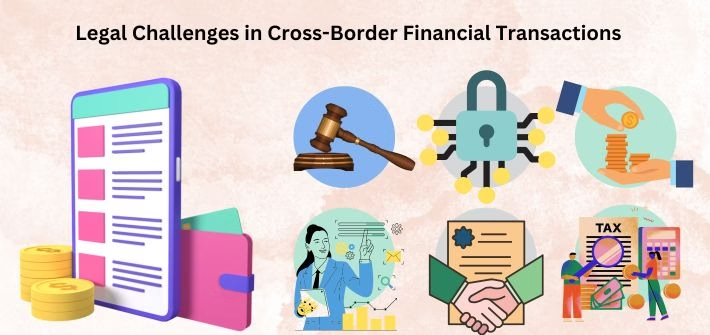International payment systems, trade financing, and even foreign investment have now become commonplace for businesses. In fact, small and medium enterprises (SMEs), along with multinational corporations and financial institutions dealing with cross-border transactions, are using these payment systems frequently nowadays. Although such transactions carry a lot of rewards in terms of accessing new markets and diversifying investments, dealing with legal issues according to the law is quite challenging.
In this brief article, I discuss borderless financial transactions and touch on contract law, regulatory compliance, dispute resolution systems, and the use of technology such as SAP CPI training, which is crucial in integrating business processes for professionals in finance dealing with cross-border transactions.
1. Different Countries Have Different Laws
One of the most pronounced issues that arise in dealing with cross-border transactions is variances in legal and regulatory structures in different countries. Every country has its own unique set of regulations. All jurisdictions have financial rules as well as banking regulations, and they all stipulate reporting methods to be used for each transaction. This situation presents legal risks for businesses in more than one external
The anti-money laundering (AML) legislation and the know-your-customer (KYC) policies are observed differently across the European Union, the United States, and Asia. Companies carrying out transactions in these countries have to deal with several overlapping compliance frameworks, which may need specialized legal, compliance, and supportive staff, making the processes cumbersome.
Not properly knowing or improperly knowing the regulations would result in punishing fees, loss of corporate esteem, and for some, loss of freedom. Businesses need to engage legal experts while ensuring their compliance structures are agile to international law shifts.

2. Legal Framework for Data Security
Both personal and financial data are crucial in the context of banking and fintech. A good number of countries have draughted and adopted laws pertaining to the privacy of data, especially as the information moves across boundaries.
As an example, the General Data Protection Regulation (GDPR) from European Union requires that any data moving out of European Union must be protected at the same level that is given inside the Union. Failure to comply with such regulations may lead to being fined heavily or losing the right to operate in some markets.
Organizations must ensure that agreements for data transfers, encryption methods, and overall data handling processes comply with all applicable laws in each jurisdiction for all regions pertinent to the transaction.
3. Restrictions on the Exchange of Currency
Some states impose controls over the conversion of local currency into foreign currency or impose caps on the quantity of funds that can exit the country.
Legal practitioners dealing with cross-border transactions need to know about these restrictions as potential infringements may arise. For instance, some jurisdictions place a prerequisite for the approval from a central bank or other regulatory institution on foreign transactions. Non-adherence to these prerequisites may cause delays in transactions, fines, or confiscation of funds.
4. Enforcement and Contractual Complications
Contracts that pertain to cross-border financial transactions are often complex and require careful attention to detail. Consideration must be given to multiple legal systems which may require drafting and negotiation of the document. Fundamental questions, including but not limited to, choice of law, jurisdiction, force majeure, and methods for resolving conflict must be articulated in the contract in precise terms.

Each country has its own laws, and enforcing a contract in a foreign country is often very difficult. While one country may recognize a contract as valid and enforceable, another country may not. This becomes worse in areas with poor legal systems or those which do not accept foreign judgments and arbitration awards.
Many international contracts have arbitration clauses to protect these risks. They state that disputes will be settled under international arbitration bodies like ICC and UNCITRAL.
5. Risks of Taxation and Double Taxation
Taxation is another legal barrier in the field of cross-border financial transactions. In some cases, businesses may be liable to pay taxes in the home country as well as the host country which can result in double taxation in the absence of agreements.
Navigating international laws of taxation requires knowledge of multi-lateral tax agreements. Most countries have signed Double Tax Avoidance Agreements (DTAAs), and while this reduces risks, adding these treaties can complicate the legal picture.
Aggressive tax planning, or even inaccurate reporting, could invite legal scrutiny from the tax system, triggering audits, fines, litigation, and other consequences.

6. Sanctions and Embargoes
Sanctions set by governments or international organizations such as the United Nations can greatly limit or completely ban dealings with specific countries, people, or organizations. Practicing financial dealings with sanctioned individuals and entities, even through collateral processes, may invoke dire fiscal repercussions such as asset seizures or criminal prosecution.
Sanctions necessitate that a business adopts comprehensive term of trade verification systems to confirm that none of the parties transacting do not appear in any global sanctions databases. This is even more important in volatile areas where constant political changes may lead to the sudden imposition of sanctions.
7. Technology and Legal Compliance
Fintech has caused a significant shift toward the digital execution and management of cross-border transactions. However, automation does not substitute the need for legal regulations.
This is the importance of SAP CPI. SAP Cloud Platform Integration (CPI) provides for the seamless data flow between on-premise and cloud applications, thus serving the international economical activities which require real-time data transfer across borders.
Working with cross-border transactions requires one to complete SAP CPI Training to ensure the platform is used legally and within regulations. This training allows finance departments to control the data flows and transfer of information between systems, a hallmark of transparency needed in legally compliant transactions.
Conclusion
In addition to large benefits and exciting opportunities for businesses, cross-border financial transactions also come with a myriad of legal challenges. They include working with countless legal frameworks, ensuring data privacy mechanisms are in place, drafting contracts that can withstand scrutiny under multiple jurisdictions, tax considerations, and many others.
International trade is rapidly evolving, exacerbated by digital transformation of the financial world, creating a need for businesses to integrate legal finesse alongside appropriate technologies and training. Remaining compliant and operationally efficient in the international arena requires finance professionals to have up-to-date knowledge of platforms, such as SAP CPI, making SAP CPI Training imperative.
From a broader perspective, overcoming the legal hurdles associated with cross-border financial transactions goes beyond legal departments—silos of legal, compliance, finance, and IT must collaboratively design and implement solutions to safeguard business interests while enabling sustainable international expansion.
Author Bio:
Shruti is an experienced content writer in the EdTech industry, creating engaging and informative content on career development, ERP tools, and SAP technologies. She focuses on topics like SAP Online Training to help professionals stay ahead in the evolving digital landscape.

